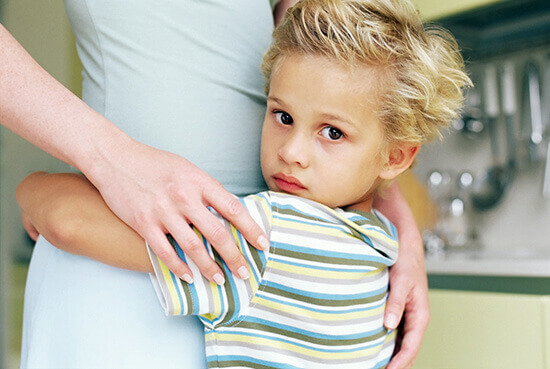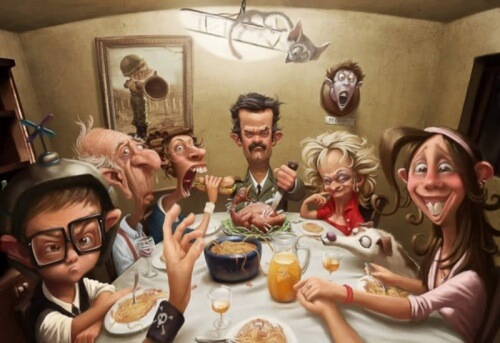Toxic Families and Their Characteristics


Written and verified by psychologist Valeria Sabater
Toxic families are like small islands that consist of a home full of conflict, orders, and dysfunction that affects all family members.
We know that the term “toxicity” is very commonly used these days. After all, we’ve all heard and used expressions like “my relationship is toxic” or “at work I have a “toxic partner“.
However, we should remember that this label doesn’t correspond to any clinical description. There’s no psychological manual that defines it, or pathology or disorder associated with the word.
However, its popular use perfectly sums up all those processes that fit very well with the word toxicity.
Why? There are people who, because of their personality, behaviour or communication style, hurt, upset, demotivate and damage our self-esteem.
Unfortunately, we don’t often talk about what goes on in the home in those small, intimate social groups we call families. After all, we often assume that they’re a place of love, comfort and support.
However, it doesn’t always work out well. The family is a very closed institution where things happen that aren’t always good.
Today, we’d like to dig deeper into this topic and the different types of toxic families and their characteristics.
Types of toxic families

Psychologists and experts in family dynamics remind us that instead of focusing on toxic families, we should talk about “toxic parents.”
Both the father and mother hold a position of power in a family. Their personality style will affect the rest of the inhabitants of the home, whether children or even older relatives such as grandparents.
Furthermore, the centre of “toxicity” is not is traced back to just one family member.
Sometimes, the relationship between a couple negatively impacts the home environment. Thus, a tense atmosphere with emotions on the surface and a high level of anxiety is created.
Let’s see what types of toxic family there are.
Manipulative, narcissistic and low-tolerance families
There are families where the dysfunction is centred on a family member with a narcissistic and manipulative profile.
- It’s common for this person to create situations where they exercise control, restrict freedoms, show a lack of respect, and display very little tolerance.
- There is a high price to living this way. The children will feel neither cared for nor respected. Thus, they’ll develop low self-esteem or even challenging behaviours if they try to react against the figure of toxic and negative power.
Immature parents and children who care for their parents

Another type of toxic family are those where the parents – either one or both – are very immature in all ways.
Low responsibility, lack of interest, carelessness, or poor control of impulses make them unreliable people.
In this case, it’s common that the children assume adult responsibilities very early on. This is some that is neither appropriate nor healthy.
Children have to go at their own pace and it’s not right to force them to grow up fast.
Parents who vent their frustrations on others
There is no worse psychological weapon than frustration seeking victims. In fact, a frustrated father or mother who projects their guilt, fears, or failures onto the children or their partner is quite common and exhausting.
All of these dynamics leave their mark. Few things can be as exhausting for a child than being forced to fulfill the dreams of their parents or to be a target for their dissatisfaction.
Parents who use their children against their spouses
In addition, there are times when a mother or a father can use their children as a “weapon” against their partner.
These are often situations that occur during divorce proceedings. However, they also happen in everyday life when children are called on to join one side or the other in order to gain something.
These dynamics are dominated by blackmail, which can be very destructive to a child’s mind.
Causes of toxicity in families

Knowing the origin of the problem in a toxic or dysfunctional family is obviously a good starting point in order to change things, develop coping strategies, and establish some harmony.
However, it’s not easy. The emotional cost is usually very high.
Furthermore, changes don’t happen overnight. This is especially if we’ve gotten used to communicating in a certain way or even not being communicated with, for example.
However, every effort will help towards a better coexistence, respect, and happiness for both parents and children.
Let’s take a look at what processes usually lie behind toxic families:
- A possible psychological disorder or addiction in any family member.
- An abuse of power and an authoritarian style.
- Absent mothers or fathers who disregard their responsibilities.
- A lack of affection, or little attachment.
- Possible physical or psychological abuse or mistreatment.
- A poor communication style, either due to a lack of skill, disinterest, or their personality.
- Incoherence or unreliability on behalf of one of the parents.
- Low self-esteem in the father or the mother.
- High expectations and need for both the couple and children to live up to them.
In conclusion, it’s quite possible that some of us will identify with many of these traits. Therefore, wherever we can, we must try to do our part to create a better environment and better relationships.
However, if we’re aware that the impact of this relationship on us is very negative, then we have to make a different kind of decision to safeguard our emotional balance and dignity.
This text is provided for informational purposes only and does not replace consultation with a professional. If in doubt, consult your specialist.








